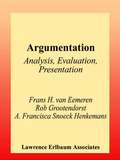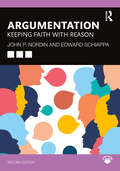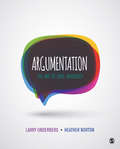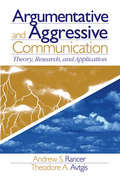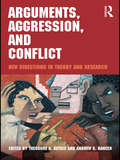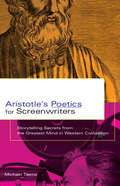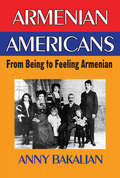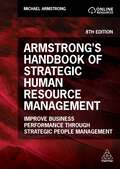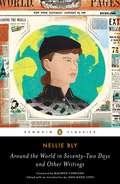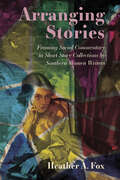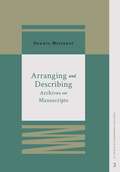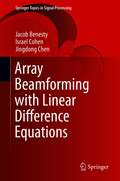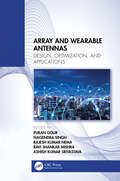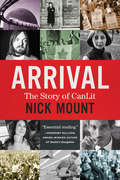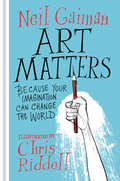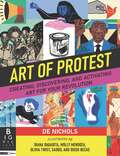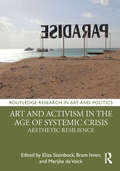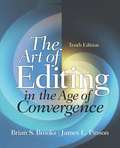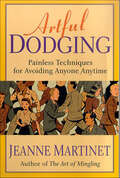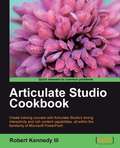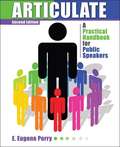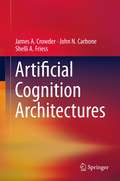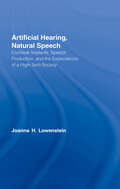- Table View
- List View
Argumentation: Analysis, Evaluation, Presentation
by Frans H. van Eemeren A. Francisca Henkemans Rob GrootendorstThis book concentrates on argumentation as it emerges in ordinary discourse, whether the discourse is institutionalized or strictly informal. Crucial concepts from the theory of argumentation are systematically discussed and explained with the help of examples from real-life discourse and texts. The basic principles are explained that are instrumental in the analysis and evaluation of argumentative discourse. Methodical instruments are offered for identifying differences of opinion, analyzing and evaluating argumentation and presenting arguments in oral and written discourse. In addition, the book provides a great variety of exercises and assignments to improve the students' skill in presenting argumentation. The authors begin their treatment of argumentation theory at the same juncture where argumentation also starts in practice: The difference of opinion that occasions the evolvement of the argumentation. Each chapter begins with a short summary of the essentials and ends with a number of exercises that students can use to master the material. Argumentation is the first introductory textbook of this kind. It is intended as a general introduction for students who are interested in a proper conduct of argumentative discourse. Suggestions for further reading are made for each topic and several extra assignments are added to the exercises. Special features: * A concise and complete treatment of both the theoretical backgrounds and the practice of argumentation analysis and evaluation. * Crucial concepts from pragmatics (speech act theory, Grice's cooperative principle) presented in a non-technical way; introducing the theory of verbal communication. * Unique coverage of both oral and written presentation of arguments. * Exercises and assignments based on real-life texts from a variety of contexts.
Argumentation: Keeping Faith with Reason
by Edward Schiappa John P. NordinThis extensively updated second edition provides a comprehensive introduction to argumentation skills for undergraduates.Clearly written, with minimal technical jargon, the book features many contemporary real-world examples. Through a unique conceptual framework, students will learn how to assemble a coherent logical argument, assess sources, and organize and present written and verbal arguments. The authors use the Toulmin model throughout to present issues and clarify concepts and have expanded the model to show how it can be used to examine real-world arguments. This new edition provides a deeper focus on value claims and credibility. It also shows students how to assess fake news, misinformation, and post-truth and incorporates more social scientific theories of persuasion such as the Elaboration Likelihood Model.Argumentation: Keeping Faith with Reason is an ideal textbook for undergraduate courses in argumentation, persuasion, critical thinking, and informal logic.An Instructor’s Manual including advice on how to teach each section, sample quizzes, and additional examples is available at https://routledge.com/9781032541228.
Argumentation: The Art of Civil Advocacy
by Larry B. Underberg Heather NortonArgumentation: The Art of Civil Advocacy teaches students the principles of argumentation as a practical way to engage in interpersonal and public deliberation. Authors Larry Underberg and Heather Norton offer a unique approach for creating civil discourse by encouraging students to consider how they argue with others to enhance or diminish opportunities for future dialogue. A variety of everyday examples are provided in the text to demonstrate how well-reasoned argumentation can strengthen communities and create productive citizenship. Students gain a better understanding for the situations, environments, and relationships that form the context for an advocate, and how those factors can influence discourse.
Argumentation: The Art of Civil Advocacy
by Larry B. Underberg Heather NortonArgumentation: The Art of Civil Advocacy teaches students the principles of argumentation as a practical way to engage in interpersonal and public deliberation. Authors Larry Underberg and Heather Norton offer a unique approach for creating civil discourse by encouraging students to consider how they argue with others to enhance or diminish opportunities for future dialogue. A variety of everyday examples are provided in the text to demonstrate how well-reasoned argumentation can strengthen communities and create productive citizenship. Students gain a better understanding for the situations, environments, and relationships that form the context for an advocate, and how those factors can influence discourse.
Argumentative and Aggressive Communication: Theory, Research, and Application
by Andrew Rancer Theodore A. AvtgisArgumentative and Aggressive Communication: Theory, Research, and Application is the first text to describe the development, history, research, and application efforts on the communication traits of argumentativeness and verbal aggressiveness. Authors Andrew S. Rancer and Theodore A. Avtgis include a collection of nine widely used reliable and valid instruments which the reader, the researcher, and the practitioner can use for diagnostic and research purposes.
Arguments, Aggression, and Conflict: New Directions in Theory and Research
by Theodore A. AvtgisArguments, Aggression, and Conflict provides a thorough examination of argumentative and aggressive communication. Editors Theodore A. Avtgis and Andrew S. Rancer bring together a score of prolific and informed authors to discuss aspects of the conceptualization and measurement of aggressive communication. The book features an exclusive focus on two "aggressive communication" traits: argumentativeness and verbal aggressiveness, one of the most dominant areas of communication research over the last twenty five years both nationally and internationally. The chapters include cutting-edge issues in the field and present new ideas for future research. This book is a valuable resource for instructors, researchers, scholars, theorists, and graduate students in communication studies and social psychology. Covering a variety of topics, from the broad-based (e.g. new directions in aggressive communication in the organizational context) to the more specific (e.g. verbal aggression in sports), this text presents a comprehensive compilation of essays on aggressive communication and conflict.
Aristotle's Poetics for Screenwriters: Storytelling Secrets from the Greatest Mind in Western Civilization
by Michael TiernoAn insightful how-to guide for writing screenplays that uses Aristotle's great work as a guide.Long considered the bible for storytellers, Aristotle's Poetics is a fixture of college courses on everything from fiction writing to dramatic theory. Now Michael Tierno shows how this great work can be an invaluable resource to screenwriters or anyone interested in studying plot structure. In carefully organized chapters, Tierno breaks down the fundamentals of screenwriting, highlighting particular aspects of Aristotle's work. Then, using examples from some of the best movies ever made, he demonstrates how to apply these ancient insights to modern-day screenwriting. This user-friendly guide covers a multitude of topics, from plotting and subplotting to dialogue and dramatic unity. Writing in a highly readable, informal tone, Tierno makes Aristotle's monumental work accessible to beginners and pros alike in areas such as screenwriting, film theory, fiction, and playwriting.
Armenian-Americans: From Being to Feeling American
by Anny BakalianAssimilation has been a contentious issues for most immigrant groups in the United States. The host society is assumed to lire immigrants and their descendants away from their ancestral heritage. Yet, in their quest for a "better" life, few immigrants intentionally forsake heir ethnic identity; most try to hold onto their culture by transplanting their traditional institutions and recreating new communities in America. Armenian-Americans are no exception. Armenian-Americans have been generally overlooked by census enumerators, survey analysts, and social scientists because of their small numbers and relative dispersion throughout the United States. They remain a little-studied group that has been called a "hidden minority." Armenian Americans fills this significant gap. Based on the results of an extensive mail questionnaire survey, in-depth interviews, and participant observation of communal gatherings, this book analyzed the individual and collective struggles of Armenian-Americans to perpetuate their Armenian legacy while actively seeking new pathways to the American Dream. This volume shows how men and women of Armenian descent become distanced from their ethnic origins with the passing of generations. Yet assimilation and maintenance of ethnic identity go hand-in-hand. The ascribed, unconscious, compulsive Armenianness of the immigrant generation is transformed into a voluntary, rational, situational Armenianness. The generational change is from being Armenian to feeling Armenian. The Armenian-American community has grown and prospered in this century. Greater tolerance of ethnic differences in the host society, the remarkable social mobility of many Armenian-Americans and the influx of large numbers of new immigrants from the Middle East and Soviet bloc in recent decades have contributed to this development. The future of this community, however, remains precarious as it strives to adjust to the ever changing social, economic, and political conditions affec
Armstrong's Handbook of Strategic Human Resource Management: Improve Business Performance Through Strategic People Management
by Michael ArmstrongArmstrong's Handbook of Strategic Human Resource Management is a complete guide to understanding how and why organizations integrate HR strategies to achieve and sustain their competitive advantage.This fully revised, practical guide contains new chapters on the foundation of strategic HRM, employee wellbeing strategies and HR analytics, as well as real-world examples and updated wider content to reflect the latest research and thinking. Now in its eighth edition, this book includes practical insights and in-depth coverage of HRM strategies in key areas such as employee engagement, talent management and learning and development, as well as strategic HRM approaches in an international context. It's supported by key learning points, key questions and real-life examples from organizations such as Boots, UNICEF and GKN. It remains an indispensable resource for both professionals and those studying HR qualifications, including undergraduate and masters' degrees and the CIPD's advanced level qualifications. Online resources include PowerPoint slides and comprehensive handbooks for lecturers and students which includes self-assessment questions, case study exercises and literature review.
Around the World in Seventy-Two Days and Other Writings
by Nellie BlyA collection of the articles and writings of famed American journalist Nellie Bly. .
Arranging Stories: Framing Social Commentary in Short Story Collections by Southern Women Writers
by Heather A. FoxBetween the 1880s and the 1940s, opportunities for southern white women writers increased dramatically, bolstered by readers’ demands for southern stories in northern periodicals. Confined by magazine requirements and social expectations, writers often relied on regional settings and tropes to attract publishers and readers before publishing work in a collection. Selecting and ordering magazine stories for these collections was not arbitrary or dictated by editors, despite a male-dominated publishing industry. Instead, it allowed writers to privilege stories, or to contextualize a story by its proximity to other tales, as a form of social commentary. For Kate Chopin, Ellen Glasgow, Marjorie Kinnan Rawlings, and Katherine Anne Porter—the authors featured in this book—publishing a volume of stories enabled them to construct a narrative framework of their own. Arranging Stories: Framing Social Commentary in Short Story Collections by Southern Women Writers is as much about how stories are constructed as how they are told. The book examines correspondence, manuscripts, periodicals, and first editions of collections. Each collection’s textual history serves as a case study for changes in the periodical marketplace and demonstrates how writers negotiated this marketplace to publish stories and garner readership. The book also includes four tables, featuring collected stories’ arrangements and publication histories, and twenty-five illustrations, featuring periodical publications, unpublished letters, and manuscript fragments obtained from nine on-site and digital archives. Short story collections guide readers through a spatial experience, in which both individual stories and the ordering of those stories become a framework for interpreting meaning. Arranging Stories invites readings that complicate how we engage collected works.
Arranging and Describing Archives and Manuscripts
by Dennis MeissnerArrangement and description lie at the very heart of the archival endeavor. While all archival functions are crucial and interdependent, arrangement and description transform the potential value of materials into practical, usable value for researchers and others. In this book, the author provides a solid foundation in the history, theory, and standards supporting arrangement and description. In addition, he clearly demonstrates the approaches, methods, and mechanics required to process archival collections. The processing landscape has changed considerably in the last decade: archivists focus more on the economics of processing, descriptive standards have matured and increased in number, new technologies and viewpoints have challenged long-standing assumptions, and evolving systems and software have changed the mechanics of metadata capture and serialization and our approaches to those fundamental processes. This is a must-read book for every archivist practicing today.
Array Beamforming with Linear Difference Equations (Springer Topics in Signal Processing #20)
by Jacob Benesty Jingdong Chen Israel CohenThis book studies the link between differential beamforming and differential equations which in turn enables the study of fundamental theory and methods of beamforming from a different perspective, leading to new insights into the problem and new methods to solve the problem. The book first presents a brief overview of the problems and methods for beamforming and some performance measures popularly used either to evaluate beamformers or to derive optimal beamformers. Then, first-order, second-order, and general high-order linear difference equations are discussed, based on which the authors show how to formulate the beamforming problem and derive different beamforming methods, including fixed and adaptive ones. Furthermore, the authors show how to apply the theory of difference equations to the general problem of speech enhancement, and deduce a number of noise reduction filters, including the maximum SNR filter, the Wiener filter, the MVDR filter, etc. Also covered in the book are the difference equations and differential beamforming from the spectral graph perspective.Presents basic concepts, fundamental principles, and methods for beamforming from the perspective of linear difference equations;Provides formulation and methods of conventional beamforming, and first-order, second-order, and general high-order linear difference equations for beamforming;Includes the applications of linear difference equations to the problem of noise reduction;Explains beamforming based on difference equations with graphs.
Array and Wearable Antennas: Design, Optimization, and Applications
by Nagendra Singh Ashish Kumar Srivastava Puran Gour Rajesh Kumar Nema Ravi Shankar MishraThe text highlights the designing of efficient, wearable, and textile antennas for medical and wireless applications. It further discusses antenna design for the Internet of Things, biomedical, and 5G applications. The book presents machine learning and deep learning techniques for antenna design and analysis. It also covers radio frequency, micro-electromechanical systems, and nanoelectromechanical systems devices for smart antenna design.This book: Explores wearable reconfigurable antennas for wireless communication and provide the latest technique in term of its structure, defective ground plane, and fractal design Focuses on current and future technologies related to antenna design, and channel characterization for different communication links, and applications Discusses machine learning techniques for antenna design and analysis Demonstrates how nano patch antenna resonates at multiple frequencies by varying the chemical potential Covers the latest antenna technology for microwave sensors, and for fiber optical sensor communications It is primarily for senior undergraduate, graduate students, and academic researchers in the fields of electrical engineering, electronics and communications engineering.
Arrival: The Story of CanLit
by Nick Mount“The most important book to be written in more than 40 years about the rise of Canadian literature… Arrival: The Story of CanLit brims and crackles, in equal measure, with information and energy.” — Winnipeg Free PressA Globe and Mail Top 100 BookNational Post 99 Best Books of the YearIn the mid-twentieth century, Canadian literature transformed from a largely ignored trickle of books into an enormous cultural phenomenon that produced Margaret Atwood, Alice Munro, Michael Ondaatje, Mordecai Richler, and so many others. In Arrival, acclaimed writer and critic Nick Mount answers the question: What caused the CanLit Boom?Written with wit and panache, Arrival tells the story of Canada’s literary awakening. Interwoven with Mount’s vivid tale are enlightening mini-biographies of the people who made it happen, from superstars Leonard Cohen and Marie-Claire Blais to lesser-known lights like the troubled and impassioned Harold Sonny Ladoo. The full range of Canada’s literary boom is here: the underground exploits of the blew ointment and Tish gangs; revolutionary critical forays by highbrow academics; the blunt-force trauma of our plain-spoken backwoods poetry; and the urgent political writing that erupted from the turmoil in Quebec.Originally published to coincide with the 150th anniversary of Canadian Confederation, Arrival is a dazzling, variegated, and inspired piece of writing that helps explain how we got from there to here.
Art Matters: Because Your Imagination Can Change the World (Apple FF)
by Neil Gaiman Chris RiddellA stunning and timely creative call-to-arms combining four extraordinary written pieces by Neil Gaiman illustrated with the striking four-color artwork of Chris Riddell.“The world always seems brighter when you’ve just made something that wasn’t there before.”—Neil GaimanDrawn from Gaiman’s trove of published speeches, poems, and creative manifestos, Art Matters is an embodiment of this remarkable multi-media artist’s vision—an exploration of how reading, imagining, and creating can transform the world and our lives.Art Matters bring together four of Gaiman’s most beloved writings on creativity and artistry: “Credo,” his remarkably concise and relevant manifesto on free expression, first delivered in the wake of the Charlie Hebdo shootings“Make Good Art,” his famous 2012 commencement address delivered at the Philadelphia University of the Arts“Making a Chair,” a poem about the joys of creating something, even when words won’t come“On Libraries,” an impassioned argument for libraries that illuminates their importance to our future and celebrates how they foster readers and daydreamersFeaturing original illustrations by Gaiman’s longtime illustrator, Chris Riddell, Art Matters is a stirring testament to the freedom of ideas that inspires us to make art in the face of adversity, and dares us to choose to be bold.
Art Of Protest: Creating, Discovering, And Activating Art For Your Revolution
by De NicholsFrom Keith Haring to Extinction Rebellion, the civil rights movement to Black Lives Matter, what does a revolution look like? Discover the power of words and images in this thought-provoking look at protest art by highly acclaimed artivist De Nichols. From the psychedelic typography used in "Make Love Not War" posters of the '60s to the solitary raised fist, some of the most memorable and striking protest artwork from across the world and throughout history deserves a long, hard look. Readers can explore each piece of art to understand how color, symbolism, technique, and typography play an important role in communication. Guided by activist, lecturer, and speaker De Nichols's powerful narrative and stunningly illustrated by a collaboration of young artists, this volume also has plenty of tips and ideas for creating your own revolutionary designs. This is a fully comprehensive look at the art of protest.
Art and Activism in the Age of Systemic Crisis: Aesthetic Resilience (Routledge Research in Art and Politics)
by Marijke De Valck Eliza Steinbock Bram IevenThis book examines how renewed forms of artistic activism were developed in the wake of the neoliberal repression since the 1980s. The volume shows the diverse ways in which artists have sought to confront systemic crises around the globe, searching for new and enduring forms of building communities and reimagining the political horizon. The authors engage in a dialogue with these artistic efforts and their histories – in particular the earlier artistic activism that was developed during the civil rights era in the 1960s and 70s – providing valuable historical insight and new conceptual reflection on the future of aesthetic resilience. This book will be of interest to scholars in contemporary art, history of art, film and literary studies, protest movements, and social movements.
Art of Editing, The (Subscription)
by Brian S. Brooks L. Pinson JamesThe Art of Editing continues to be the standard by which editing texts are judged, offering the most comprehensive and up-to-date discussion of editing available. Long viewed as the "classic" in the field of editing, The Art of Editing continues to evolve to meet the needs of today's students. In addition to a focus on traditional newspaper editing, the authors pay significant attention to the other areas in which students are increasingly finding jobs: online media, corporate magazines, broadcasting, public relations and advertising. The ninth edition of The Art of Editing details the major changes revolutionizing the media industry and prepares students to work in convergent environments, where skill in print, broadcast and online operations is essential.
Artful Dodging: Painless Techniques for Avoiding Anyone Anytime
by Jeanne MartinetA lighthearted and indispensable guide to gracefully side-stepping anyone, by the author of The Art of MinglingWhether you're dodging an overbearing boss, the chatty guy next to you on an overcrowded flight, your least favorite client, your least favorite parent, or anyone else, this lighthearted, indispensable guide will show you how to make a seamless, effective escape.The perfect guide for our over-committed, hectic times, Artful Dodging puts an end to all those feeble excuses no one ever believes. It banishes, once and for all, the notion of an invitation you can't refuse. In an almost Kryptonite-like fashion, it helps to break the vice of social obligation that has so many of us in its grip. Yes, it's true: Artful Dodging can set you free.Topics include: the pros and cons of using a Classic Excuse * mastering the Duck and Cover * using voice mail, Call Waiting, and other telephone techniques * emergency escape tactics * flattery, melodrama, and other dodging diversions * vanishing into thin air * and much more.For everyone who's mastered the art of making friends and now needs to improve at shaking them, Artful Dodging comes to the rescue, with humor, smarts, and a great exit line.
Articulate Studio Cookbook
by Robert Kennedy IIIThe cookbook style is a series of practical recipes which represent solutions to problems and popular activities in a concise but detailed manner. If you are a beginning developer or just someone who has been asked to be the jack-of-all-design in your training department, then this book is a great starter. Having a working knowledge of PowerPoint is helpful but not essential. By simply following the steps, you will be able to create a clean, professional looking course.
Articulate! A Handbook for Public Speakers (2nd Edition)
by E. Eugene PerryArticulate focuses on practical applications on public speaking. It enables students to improve their skills through assignments.
Articulation and Phonology In Speech Sound Disorders: A Clinical Focus
by Jacqueline Bauman-WaenglerThis comprehensive book ties strong academic foundations directly to their clinical application for speech/language therapists working with speech sound disorders. Each chapter presents tools to help readers bridge the gap between theoretical issues and clinical applications by presenting Clinical Applications, Clinical Exercises, Case Studies, and a section called Think Critically, which asks students to further apply specific clinical concepts. Test Yourself multiple choice questions appear at the end of each chapter and are ideal for review and assessment of the knowledge presented in the chapters, and Further Readings allow readers to continue to expand their knowledge. The new Fifth Edition of Articulation and Phonology in Speech Sound Disorders reflects the current use of the term "speech sound disorder," an umbrella term for what was previously noted as articulation- and phonemic-based disorders.
Artificial Cognition Architectures
by Shelli Friess John N. Carbone James CrowderThe goal of this book is to establish the foundation, principles, theory, and concepts that are the backbone of real, autonomous Artificial Intelligence. Presented here are some basic human intelligence concepts framed for Artificial Intelligence systems. These include concepts like Metacognition and Metamemory, along with architectural constructs for Artificial Intelligence versions of human brain functions like the prefrontal cortex. Also presented are possible hardware and software architectures that lend themselves to learning, reasoning, and self-evolution
Artificial Hearing, Natural Speech: Cochlear Implants, Speech Production, and the Expectations of a High-Tech Society (Outstanding Dissertations in Linguistics)
by Joanna Hart LowensteinThis book explores the interface between speech perception and production through a longitudinal acoustic analysis of the speech of postlingually deaf adults with cochlear implants (electrode and computer prostheses for the inner ear in cases of nerve deafness). The methodology is based on the work of Joseph Perkell at MIT, replicating and extending analysis to subjects with modern digital cochlear implants and processor technology. Lowenstein also examines how cochlear implants are portrayed in dramatic and documentary television programs, the scientific accuracy of those portrayals, and what expectations might be taken away by viewers, particularly given modern society's view that technology can overcome the frailties of the human body.
